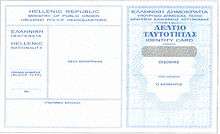Greek identity card


The Greek identity Card (Greek: Δελτίο αστυνομικής ταυτότητας) is an official document of the Hellenic Republic, used to certify one's identity in any occasion.
The authority handling the issuing is the Hellenic Police, and possession of this document is mandatory for all Greeks over 12 years of age. Citizens are obliged to always carry it, and produce it at police's request; failing to do so may result in the citizen's identification at the nearest police station. A passport is considered of equal value to the ID card, when certifying one's identity.
The ID card is a valid travel document in Europe (except Belarus, Kosovo, Russia and Ukraine), to Georgia, Turkey and on organized tours to Jordan (through Aqaba airport).[1] Moreover, it is also used to identify a person of citizens in local and EU elections. ID cards are valid for 15 years and the bearer's name is also typed in Latin characters since 2000. Older ID cards, written in Greek characters only, are still valid and of equal value, provided that less than 15 years have passed since the issue date.[2]
Military staff, as well as personnel of the police, fire brigade, coast guard, and intelligent services, carry special IDs until retiring or exiting their services.
Description
The front side includes areas bearing the holder's signature, a black and white photograph of specific standards, the blood type and rhesus, as well as data of the identity card (number, place and date of issue, issuing authority). The back side includes the surname, first name and the name of the father and the mother of the identity card holder with Greek and Latin characters, as well as date and place of birth, height, the municipality in which the holder is registered and the municipality registration number and finally the authority issuing the identity card.
Before 2005 the ID card was mandatory for citizens over 14 years of age, and included data which were removed after 2005 due to privacy concerns and / or because they are no longer considered necessary for the purpose of identification of the person:
- Profession
- Religion
- Address
- Name of spouse
- The index fingerprint of the right hand
- Eye and hair color
- Citizenship
Technical characteristics
The Greek identity card is made of laminated paper, measuring 11 x 6.5 cm. As a means of preventing counterfeits, the paper on which it is printed bears a watermark, but otherwise lacks security features (i.e. fluorescent inks, micro-chips, holograms) found in IDs of other countries. Nonetheless, Greece has the technology and the experience of printing high-security ID cards and Driving licences.[3] Since 2010, Police Staff, Special Guards and Border Guards have high-security identity cards, that meets international quality standards.[4][5][6] There had been unofficial talks of switching to a new ID type, one that could possibly bear the holder's social security number, a biometric photograph and other security features, sized down to that of a credit card.[7][8] However, after the November 2015 Paris attacks, the Greek Ministry of Interior is seriously considering switching to the new ID type.[9][10]In the 11th of March 2016 the Greek Ministry of Interior established a commission to create a plan for the new ids.[11]
Removal of religion and nationality
On May 8, 2000 in an interview published in newspaper Eleftherotypia, Minister of Justice Michael Stathopoulos announced that the mandatory inclusion of religion on identity cards was contrary to law 2472/1997 for the protection of personal data. The Church of Greece immediately objected to the removal of religion from identity cards, organizing rallies, among which a rally in Thessaloniki on 14 June, in the presence of Archbishop Christodoulos. The Public Order Minister announced on 17 July that religion be removed from the new identities. On September 24, 2000 the church began collecting signatures in the parishes, seeking a referendum. The petition was completed in April 2001, gathering more than 3 million signatures. On August 29, 2001 Archbishop delivered to the President of the Hellenic Republic Constantinos Stephanopoulos the signatures, but the president refused to receive them saying that "everybody has an obligation to comply with the laws of the State".[12]
The State Council decided that the mandatory indication of religious affiliation on identity cards is not legal,[13] while the Data Protection Authority also opposed to the optional reference to religion by adding the letters "XO" (Christian Orthodox - Χριστιανός Ορθόδοξος) following the signature of the bearer.[14] The legality of collecting signatures was also questioned by the Minister of Justice Michael Stathopoulos.[15]
See also
Sources
- The first version of this article is based in el:Δελτίο αστυνομικής ταυτότητας (Ελλάδα), contributed under CC-BY-SA.
- Greek Police - Identity Card Version (In Greek)
References
- ↑ http://www.mfa.gov.tr/countries-whose-citizens-are-allowed-to-enter-turkey-with-their-national-id_s.en.mfa
- ↑ In Greek: replacing an ID "when a period of fifteen years passed since the issue date"
- ↑ http://ec.europa.eu/transport/road_safety/topics/driving-licence/models/greece/gr5/gr-gr5_en.htm?date=19/1/2009
- ↑ http://www.enet.gr/?i=news.el.article&id=218573
- ↑ https://www.youtube.com/watch?v=jpkLp-xjiTM
- ↑ http://www.dikaiologitika.gr/arxeio/9342/taftotita-astynomikoy-neou-typou
- ↑ http://www.tovima.gr/science/article/?aid=244778
- ↑ http://www.tovima.gr/society/article/?aid=462255
- ↑ "Κοτζιάς: Τροποποίηση και αναβάθμιση των δελτίων ταυτότητας | Kathimerini". www.kathimerini.gr. Retrieved 2015-11-24.
- ↑ http://www.ekathimerini.com/204123/article/ekathimerini/news/greece-working-to-improve-security-of-identity-cards
- ↑ "Έρχονται οι νέες ταυτότητες. Στα 10 ευρώ η επιβάρυνση για τους πολίτες". news247.gr. Retrieved 17 March 2016.
- ↑ ethnos.gr Σηκώνει το λάβαρο στον πόλεμο των ταυτοτήτων (He is lifting the banner in the war of identities)
- ↑ news.in.gr «No." identities of CoE - no mandatory recording of religion, considered the Plenary Session
- ↑ news.in.gr «No," said Authority Data indirect reference to religion in the form of XO in the signature
- ↑ news.in.gr without authority and outside legality of the petition says M. Stathopoulos